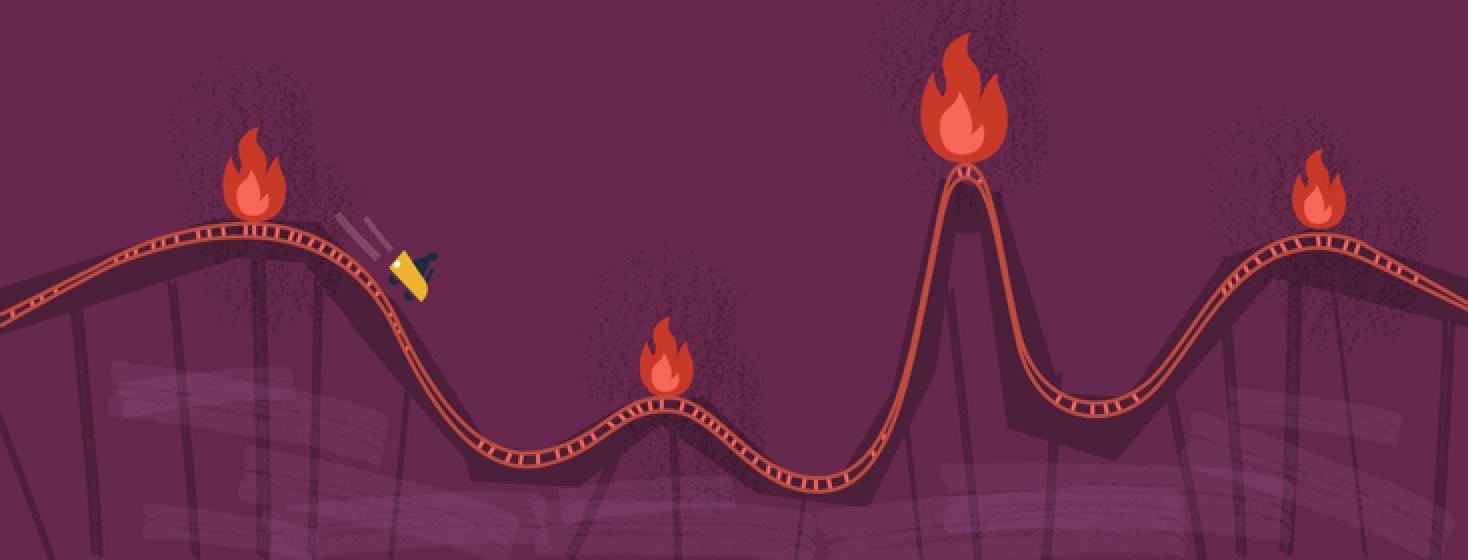Coping with Crohn’s Flare-Ups
Although life with Crohn’s can be quite different for each person with the condition, there is one experience that is all too familiar for those with CD: flares. Whether it was a flare that led to your diagnosis or recurring flares that continue to arise and provide significant challenges, flares are incredibly common in the Crohn’s community. We recently completed our 2019 IBD In America survey to better understand life with Crohn’s, including its flares. When it comes to flares and how to cope, 1,000 individuals with Crohn’s or Crohn’s colitis sounded off on their experiences. Some of the informative responses we received are below.
How often flares occur and how long they last
Flares are a common occurrence for those in the community, with 14 percent experiencing one flare in the past year, and 31 percent experiencing two to four flares in the past year. Another 21 percent reported having five to ten flares, and 18 percent reported more than ten flares in the past year. This suggests that although the number of flares per year may vary, many will experience them in some form. Only 15 percent reported no flares or being in remission for the past year.
While flares may be common, the length of time they last can vary greatly. For example, about 17 percent of participants reported that their last flare lasted less than a week, and 19 percent said their last flare was between one and two weeks. Another 18 percent said their last flare was between two weeks and a month. Longer flares, including flares that lasted one to three months or three to six months were reported by 15 and eight percent of participants, respectfully. Over 15 percent said their last flare lasted longer than six months. It’s clear from this data that while flares in general may be common in the Crohn’s community, their duration can be quite different from person to person.
Physical symptoms and emotional impacts of flares
Flares can bring many different physical symptoms and emotional challenges. Some of the most shared physical attributes of a flare reported by participants were an increase in frequency or severity of common Crohn’s symptoms, including, but not limited to:
- Abdominal pain and cramping
- Uncontrollable diarrhea
- Fatigue
- Urgency
- Accidents
- Nausea and/or vomiting
- Weight loss
As far as the emotional impact of flares, common experiences included feelings of depression, anger, embarrassment, or frustration. Additionally, feelings of fear, anxiety, or worry about potentially tricky situations were also commonly shared. These included feelings of anxiety about leaving the house, making it to the bathroom on time, and accidents or unexpected wet farts. The physical symptoms of a Crohn’s flare can be difficult on their own, however, the added emotional concerns or pressures can make a flare that much more difficult to navigate.
"Stressed and unsure if this is just a symptom flare or a flare of active disease and/or a signal that the current treatment isn’t working." -Crohn's patient
"Stabbing, cramping, and throbbing severe pain across the bottom of my stomach and up the right side. The pain is so bad I scream in agony and usually tears will automatically stream down my face whether I want to cry." -Crohn's patient
"I’m always tired because of blood loss and frequent bathroom trips. My intestines are swollen and are painful. I feel anxious about being at work and having to go to the bathroom and not making it in time." -Crohn's patient
Common coping strategies for Crohn’s flares
Our responses made it clear that flares can be quite the challenge, so how can we cope? In addition to the insightful responses we received on flares themselves, many also shared how they make it through their flares and help make the frustration and symptoms more bearable. Some tactics shared included improving mental wellbeing, such as binging a favorite TV show, venting to friends, turning to faith or spirituality, and practicing meditation (39 percent, 33 percent, 33 percent, and 19 percent, respectively). Other common tactics were aimed at alleviating physical symptoms, such as avoiding certain foods (including much-loved foods), eating smaller meals, taking a vitamin or probiotic, and exercising (69 percent, 65 percent, 38 percent, and 18 percent, respectively). About 35 percent reported visiting an online support group or community (like this one) for support, information, and encouragement.
Although there are numerous ways to cope with a flare, only you know your body best and what it needs or responds to. Are there any tips you use to get through a flare or any common flare coping tips that resonated with you?

Join the conversation